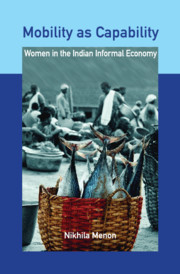Book contents
- Frontmatter
- Dedication
- Contents
- List of Tables
- List of Figures
- Preface
- 1 Transformational Mobility as Capability
- 2 Reflections on Transformational Mobility, Autonomy, and Women's Work
- 3 Women in ‘Kerala Model’: Myths and Realities
- 4 Situating Informal Work by Women in Fisheries in Kerala
- 5 ‘Measuring Mobility’ of Women: Unravelling the ‘Explicit’ and the ‘Implicit’
- 6 Pathways to Transformational Mobility of Women Workers: A Qualitative Comparative Analysis
- 7 ‘Subordinating Self’: ‘Manoeuvring Patriarchy’ among Women Workers
- 8 Self-Categorization, Group Identity, and Agency among Women Fish Vendors
- 9 Transformational Mobility: From Individual to Collective Agency of Informal Women Workers
- Bibliography
- Index
4 - Situating Informal Work by Women in Fisheries in Kerala
Published online by Cambridge University Press: 24 May 2020
- Frontmatter
- Dedication
- Contents
- List of Tables
- List of Figures
- Preface
- 1 Transformational Mobility as Capability
- 2 Reflections on Transformational Mobility, Autonomy, and Women's Work
- 3 Women in ‘Kerala Model’: Myths and Realities
- 4 Situating Informal Work by Women in Fisheries in Kerala
- 5 ‘Measuring Mobility’ of Women: Unravelling the ‘Explicit’ and the ‘Implicit’
- 6 Pathways to Transformational Mobility of Women Workers: A Qualitative Comparative Analysis
- 7 ‘Subordinating Self’: ‘Manoeuvring Patriarchy’ among Women Workers
- 8 Self-Categorization, Group Identity, and Agency among Women Fish Vendors
- 9 Transformational Mobility: From Individual to Collective Agency of Informal Women Workers
- Bibliography
- Index
Summary
You are not a drop in the ocean, You are the entire ocean in a drop.
—RumiWomen are an integral part of the fisheries ecosystem and post-harvest fisheries work. There are strong traditional gender norms that are prevalent among the fisher folk which determine the choice of occupation of women in fisheries. Within the fisheries, there is almost complete segregation of work between males and females which cannot be explained on the basis of the human capital theory. In the case of fisheries in Kerala, the supply of labour by women workers cannot be analysed in the neoclassical framework of demand and supply and as a choice between work and leisure. The occupational segregation in fisheries in Kerala is mainly owing to social and cultural norms that prevent women from having ownership of boats, processing units, or any other technology-based work. Women are mostly engaged in peeling (pre-processing work) and marketing (vending) jobs as can be seen in Table 4.1.
The advantages of new technology in the fisheries have mostly favoured men in terms of advanced mechanized boats, freezing, and storing technologies. The particular livelihood strategies women adopt both reflect and further generate experiences of economic processes that differ from men’s, and the increased commercialization in the fisheries sector have rewarded the masculine norms of work and economy in Kerala fisheries (Hapke and Ayyankeril, 2004). The infusion of technology in fisheries in the early 1970s (Norwegian project) completely marginalized women, and women became increasingly engaged in pre-processing work that involved manual labour in unhygienic conditions. A study on shrimp pre-processing units in Alappuzha district of Kerala has noted the lack of development of infrastructure and basic facilities resulting in unhealthy conditions of work for the majority of women workers (Sathyan, Afsal, and Thomas, 2014). This type of work is considered demeaning, and women from fishing community participate in pre-processing to supplement household incomes since they belong to poor deprived sections.
The caste orientation of fish vending work and the traditional nature of the occupation that is followed by generations have been noted in one of the earliest studies on fish vendors (Gulati, 1984). The participation in the informal work is mainly influenced by gender norms, the stability of incomes of the household, the ability of women to balance her productive and reproductive roles, and other sociocultural factors that warrant in-depth analysis.
- Type
- Chapter
- Information
- Mobility as CapabilityWomen in the Indian Informal Economy, pp. 47 - 65Publisher: Cambridge University PressPrint publication year: 2021



